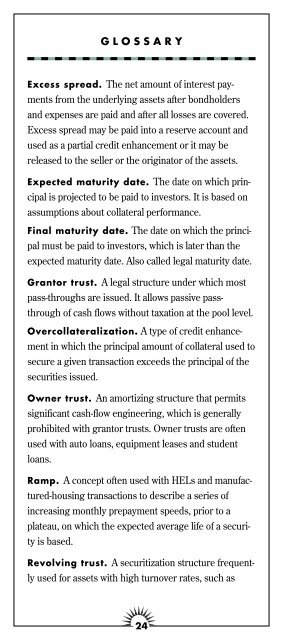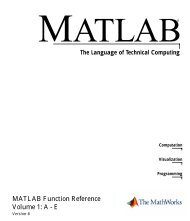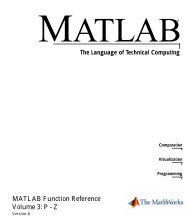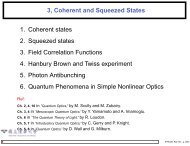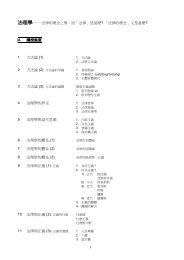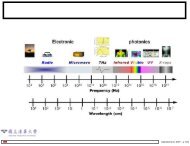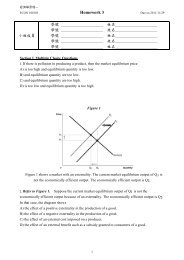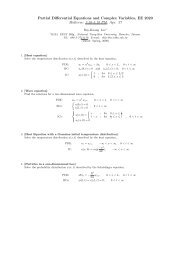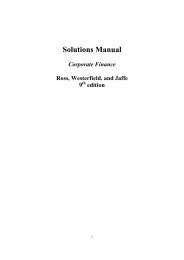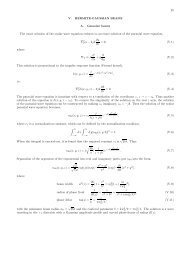assetbacked Pages
assetbacked Pages
assetbacked Pages
Create successful ePaper yourself
Turn your PDF publications into a flip-book with our unique Google optimized e-Paper software.
GLOSSARY<br />
Excess spread. The net amount of interest payments<br />
from the underlying assets after bondholders<br />
and expenses are paid and after all losses are covered.<br />
Excess spread may be paid into a reserve account and<br />
used as a partial credit enhancement or it may be<br />
released to the seller or the originator of the assets.<br />
Expected maturity date. The date on which principal<br />
is projected to be paid to investors. It is based on<br />
assumptions about collateral performance.<br />
Final maturity date. The date on which the principal<br />
must be paid to investors, which is later than the<br />
expected maturity date. Also called legal maturity date.<br />
Grantor trust. A legal structure under which most<br />
pass-throughs are issued. It allows passive passthrough<br />
of cash flows without taxation at the pool level.<br />
Overcollateralization. A type of credit enhancement<br />
in which the principal amount of collateral used to<br />
secure a given transaction exceeds the principal of the<br />
securities issued.<br />
Owner trust. An amortizing structure that permits<br />
significant cash-flow engineering, which is generally<br />
prohibited with grantor trusts. Owner trusts are often<br />
used with auto loans, equipment leases and student<br />
loans.<br />
Ramp. A concept often used with HELs and manufactured-housing<br />
transactions to describe a series of<br />
increasing monthly prepayment speeds, prior to a<br />
plateau, on which the expected average life of a security<br />
is based.<br />
Revolving trust. A securitization structure frequently<br />
used for assets with high turnover rates, such as<br />
24<br />
credit card, trade and dealer floor-plan receivables. It is<br />
characterized by having a revolving period and an accumulation<br />
(or controlled-amortization) period.<br />
Seasoning. The age of accounts. In the ABS market,<br />
this term refers to the fact that various asset types have<br />
different seasoning patterns, which are characterized<br />
by periods of rising and then declining losses.<br />
Special-purpose vehicle (SPV). A bankruptcyremote<br />
entity set up to insulate the issuer of ABS (the<br />
trust) from the sponsor, or originator, of the assets.<br />
Also called special-purpose corporation (SPC).<br />
Surety bond. A bond that backs the performance of<br />
another. In the ABS market, a surety bond is an insurance<br />
policy typically provided by a rated and regulated<br />
monoline insurance company to guarantee securities<br />
holders against default.<br />
Tranche. One class of a securities issue which shares<br />
the same characteristics. Tranche is the French word<br />
for “slice.”<br />
True sale. An actual sale, as distinct from a secured<br />
borrowing, which means that assets transferred to an<br />
SPV are not expected to be consolidated with those of<br />
the sponsor in the event of the sponsor’s bankruptcy.<br />
Rating agencies usually require what is called a truesale<br />
opinion from a law firm before the securities can<br />
receive a rating higher than that of the sponsor.<br />
40 Broad Street, New York, NY 10004-2373<br />
212.440.9430<br />
Washington Office: 1445 New York Avenue, NW<br />
Washington, DC 20005-2158 • 202.434.8400<br />
http://www.bondmarkets.com<br />
Copyright 1998. All reproduction and other rights reserved.<br />
25


